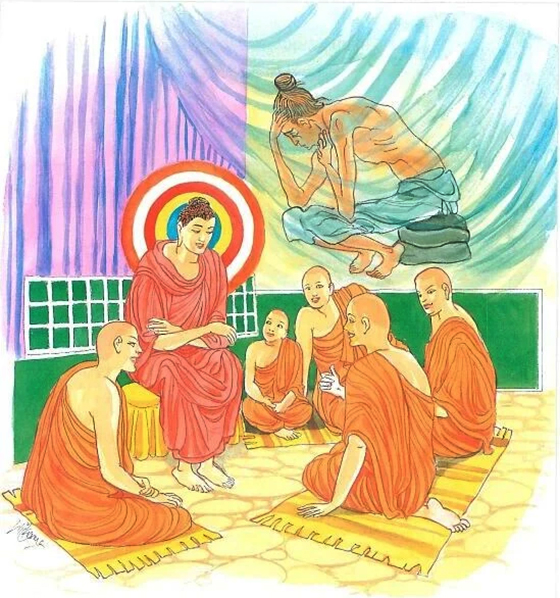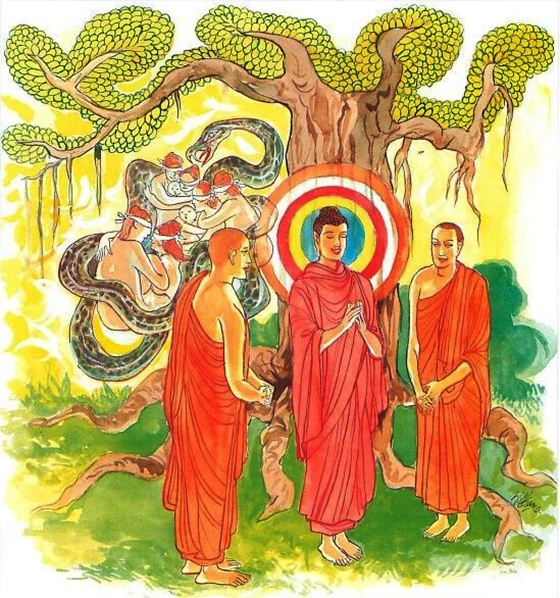Verse 197: Indeed we live very happily, not hating anyone among those who hate; among men who hate we live without hating anyone.
Verse 198: Indeed we live very happily, in good health among the ailing; among men who are ailing we live in good health.
Verse 199: Indeed we live very happily, not striving (for sensual pleasures) among these who strive (for them); among those who strive (for them) we live without striving.
- aturesu/atura: ailing or ailment; moral ailment is meant here.
The Story of the Pacification of the Relatives of the Buddha
The Buddha uttered Verse (197) to (199) of this book, in the Sakyan country, with reference to his relatives who were quarrelling over the use of the water from the Rohini river.
Kapilavatthu the town of the Sakyans and Koliya the town of the Kolyans were situated on either side of the Rohini river. The cultivators of both towns worked the fields watered by the Rohini river. One year, they did not have enough rain and finding that the paddy and other crops were beginning to shrivel up, cultivators on both sides wanted to divert the water from the Rohini river to their own fields. Those living in Koliya said that there was not enough water in the river for both sides, and that if only they could channel the water just once more to their fields that would be enough for the paddy to mature and ripen. On the other hand, people from Kapilavatthu argued that, in that case, they would be denied the use of the water and their crops would surely fail, and they would be compelled to buy from other people. They said that they were not prepared to go carrying their money and valuables to the opposite bank of the river in exchange for food.
Both sides wanted the water for their own use only and there was much ill will between them due to abusive language and accusations on both sides. The quarrel that started between the cultivators came to the ears of the ministers concerned, and they reported the matter to their respective rulers, and both sides prepared to go to war.
The Buddha, surveying the world with his supernormal powers, saw his relatives on both sides of the river coming out to meet in battle and he decided to stop them. All alone, he went to them by going through the sky, and stopped immediately above the middle of the river. His relatives seeing him, powerfully and yet peacefully sitting above them in the sky, hid aside all their weapons and paid obeisance to the Buddha. Then, the Buddha said to them, “For the sake of some water, which is of little value, you should not destroy your lives which are of so much value and priceless. Why have you taken this stupid action? If I had not stopped you today, your blood would have been flowing like a river by now. You live hating your enemies, but I have none to hate; you are ailing with moral defilements, but I am free from them; you are striving to have sensual pleasures, but I do not strive for them.”
Then the Buddha spoke in verse as follows:
Verse 197: Indeed we live very happily, not hating anyone among those who hate; among men who hate we live without hating anyone.
Verse 198: Indeed we live very happily, in good health among the ailing; among men who are ailing we live in good health.
Verse 199: Indeed we live very happily, not striving (for sensual pleasures) among these who strive (for them); among those who strive (for them) we live without striving.
At the end of the discourse many people attained Sotapatti Fruition.
Dhammapada Verses 197, 198 and 199
Natikalahavupasamana Vatthu
Susukham vata jivama
verinesu averino
verinesu manussesu
viharama averino.
Susukham vata jivama
aturesu1 anatura
aturesu manussesu
viharama anatura.
Susukham vata jivama
ussukesu anussuka
ussukesu manussesu
viharama anussuka.
Source: Tipitaka










Add a comment